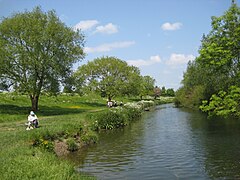Grantchester
| Grantchester | |
|---|---|
 The banks of the River Cam at Grantchester |
|
| Grantchester shown within Cambridgeshire | |
| Population | 540 (2011 Census) |
| OS grid reference | TL432555 |
| District | |
| Shire county | |
| Region | |
| Country | England |
| Sovereign state | United Kingdom |
| Post town | CAMBRIDGE |
| Postcode district | CB3 |
| Dialling code | 01223 |
| Police | Cambridgeshire |
| Fire | Cambridgeshire |
| Ambulance | East of England |
| EU Parliament | East of England |
Grantchester is a village on the River Cam or Granta in South Cambridgeshire, England. It lies close to Cambridge.
The village of Grantchester is listed in the 1086 Domesday Book as Grantesete and Grauntsethe. It is also mentioned briefly in book IV, chapter 19 of Bede's Ecclesiastical History of the English People. John de Grauntsete, a lawyer who had a successful career as a judge in Ireland, was born in Grantchester, c. 1270. The present name derives from the common Old English suffix -ceaster (variously developed as "-cester", "-caster", and -"chester"), used in names of forts or fortified cities throughout England.
Grantchester is sometimes identified as the Cair Grauth ("Fort Granta") listed in the History of the Britons among the 28 cities of Britain, but the Roman Duroliponte and subsequent major British and Saxon settlements in the area were at Castle Hill in Cambridge, whose Old English name was Grantabrycge. The confusion arises from the lower stretches of the Granta having been renamed the Cam after the city.
Grantchester is said to have the world's highest concentration of Nobel Prize winners, most of these presumably being current or retired academics from the nearby University of Cambridge. Students and tourists often travel from Cambridge by punt to picnic in the meadows or take tea at The Orchard. In 1897, a group of Cambridge students persuaded the owner of Orchard House to serve them tea in its apple orchard, and this became a regular practice. Lodgers at Orchard House included the Edwardian poet Rupert Brooke, who later moved next door to the Old Vicarage. In 1912, while in Berlin, he wrote a poem of homesickness entitled "The Old Vicarage, Grantchester". The house is currently the home of the Cambridge scientist Mary Archer and her husband, Jeffrey Archer. Grantchester has been the home since 1969 of the sculptor Helaine Blumenfeld OBE.
...
Wikipedia

